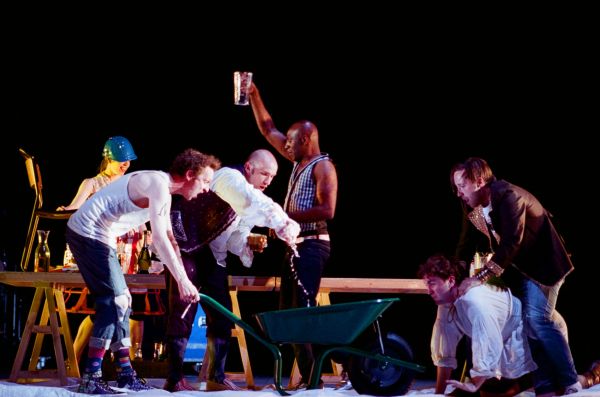The School for Scandal, Barbican Theatre | reviews, news & interviews
The School for Scandal, Barbican Theatre
The School for Scandal, Barbican Theatre
All the sound and fury in the world fails to turn a Sheridan comedy into an epic
"There’s no possibility of being witty without a little ill-nature,” preaches the Gospel according to Richard Brinsley Sheridan. What the playwright omits to mention, however, is that it is possible to be ill-natured without in fact being terribly witty, a flaw that proves almost fatal for Warner’s acerbic, alienated new production of The School for Scandal. Overstyling Sheridan’s most stylised of comedies, Warner turns what Hazlitt described as the most “finished and faultless” play into a mass of tensions, exaggerations and contradictions. The result can be exhilarating in the moment, but wears off into confusion and a slight headache.
If the Earl of Rochester and Bertolt Brecht got high together in Shoreditch one night and decided to host a rave (inviting Handel to man the decks), the result might look a lot like Deborah Warner’s new production of The School for Scandal. Thumping bass greets you as you enter the theatre, soundtracking the modish prancings and poutings of a motley collection of what appeared to be hangers-on at a Vivienne Westwood fashion show. Corsets and crinolines jostle alongside denim, and placards carried by the figures (“Pert rural coquette”, “Libertine”) leave us in no doubt as to the archetypes you are about to witness.
Add roughly drawn scene flats, stage directions emblazoned on banners and a framing Act I in which we see our cast laced and buckled into their period roles, and it only lacks Fiona Shaw to turn The School for Scandal into Warner’s recent National Theatre production of Mother Courage. Self-conscious anachronisms persist throughout, with Sir Peter Teazle bemoaning the influence of a glossy magazine on his young wife, and the wild young Charles and his cronies existing in a permanent state of distinctly 21st-century debauchery. It’s all rather stylish, but also rather familiar.
 It’s been over 10 years since Sheridan’s social satire had a major revival in this country; that its return to the stage should coincide with Warner’s first Barbican production since becoming artistic associate seemed to promise the work a provocative comeback. Such slick, artificial comedy certainly marks an unexpected departure for Warner, but one she seems determined to reframe in her own terms, stripping the play of its fast-paced verbal strengths without adding much by way of satisfactory psychology. Brechtian devices chafe alongside the naturalistic diffidence of some of the performances, each good in their own way but dramatically incompatible.
It’s been over 10 years since Sheridan’s social satire had a major revival in this country; that its return to the stage should coincide with Warner’s first Barbican production since becoming artistic associate seemed to promise the work a provocative comeback. Such slick, artificial comedy certainly marks an unexpected departure for Warner, but one she seems determined to reframe in her own terms, stripping the play of its fast-paced verbal strengths without adding much by way of satisfactory psychology. Brechtian devices chafe alongside the naturalistic diffidence of some of the performances, each good in their own way but dramatically incompatible.
And then there’s the anti-Semitism, the material that takes the social and moral temperature of any production. With moneylender Moses played with fluting lisp and knock-kneed awkwardness by Adam Gillen, it’s clear that fidelity (however unpalatable) is to be the order of the day. Watch the audience trying hard not to laugh during Gillen’s skilful comedy and you’ll see squirming testimony to the success of Warner’s risk-taking here, turning cruel pantomime into a provocative social experiment.
 Led by the magnificent Alan Howard as Sir Peter Teazle, the cast offer all the delicacy of touch that Warner’s direction for the most part lacks. Ploughing across the stage with the aid of two sticks, like a belligerent and arthritic wolfhound, Howard’s quiet cynicism is all under-the-breath grumbles and laconic asides, inward where John Shrapnel’s Sir Oliver (pictured above) is exuberant, and all the better for it.
Led by the magnificent Alan Howard as Sir Peter Teazle, the cast offer all the delicacy of touch that Warner’s direction for the most part lacks. Ploughing across the stage with the aid of two sticks, like a belligerent and arthritic wolfhound, Howard’s quiet cynicism is all under-the-breath grumbles and laconic asides, inward where John Shrapnel’s Sir Oliver (pictured above) is exuberant, and all the better for it.
Katherine Parkinson shows her comedic mettle as Lady Teazle, courting but never surrendering to the vulgarity that lurks in the corners of the character, and the byplay between husband and wife (which delights in some of Sheridan’s finest repartee) is brisk and deadly. It is, however, outdone by the twitching, fidgeting nervous energy of Leo Bill’s Charles, a drug-addled wit-by-accident, whose good nature is tangled up but never entirely obscured by his fecklessness.
The ensemble comedy of the assorted society gossips and posers creaks a bit by comparison, despite Matilda Ziegler's efforts as Lady Sneerwell, the scheming Madonna-turned-whore of this immorality play. Vicki Pepperdine struggles under the limitations of the aptly named Mrs Candour, while the double act of Sir Benjamin Backbite (Harry Melling) and his uncle Crabtree (Stephen Kennedy) proves as garish and ill-judged as their costumes.
Sheridan’s humour, like that of Wilde, is not the humour of character; his plays conceal within their dramatic artifice a single coherent voice – that of the playwright himself. In the mêlée of sound, concept and styling that make up Warner’s manic production, it is this voice that is lost. Without its anchorage and authority the play drifts, entertainingly enough at times, but lacking the restraint that is needed if the brittle beauty of the text is to survive. The School for Scandal is a play of glittering surfaces; Warner’s mistake is to try to offer it substance.
- The School for Scandal is at the Barbican until 18 June
- See what's on at the Barbican Centre. Read Barbican reviews
 Find Richard Brinsley Sheridan on Amazon
Find Richard Brinsley Sheridan on Amazon
Add comment
more Theatre
 London Tide, National Theatre review - haunting moody river blues
New play-with-songs version of Dickens’s 'Our Mutual Friend' is a panoramic Victori-noir
London Tide, National Theatre review - haunting moody river blues
New play-with-songs version of Dickens’s 'Our Mutual Friend' is a panoramic Victori-noir
 Machinal, The Old Vic review - note-perfect pity and terror
Sophie Treadwell's 1928 hard hitter gets full musical and choreographic treatment
Machinal, The Old Vic review - note-perfect pity and terror
Sophie Treadwell's 1928 hard hitter gets full musical and choreographic treatment
 An Actor Convalescing in Devon, Hampstead Theatre review - old school actor tells old school stories
Fact emerges skilfully repackaged as fiction in an affecting solo show by Richard Nelson
An Actor Convalescing in Devon, Hampstead Theatre review - old school actor tells old school stories
Fact emerges skilfully repackaged as fiction in an affecting solo show by Richard Nelson
 The Comeuppance, Almeida Theatre review - remembering high-school high jinks
Latest from American penman Branden Jacobs-Jenkins is less than the sum of its parts
The Comeuppance, Almeida Theatre review - remembering high-school high jinks
Latest from American penman Branden Jacobs-Jenkins is less than the sum of its parts
 Richard, My Richard, Theatre Royal Bury St Edmund's review - too much history, not enough drama
Philippa Gregory’s first play tries to exonerate Richard III, with mixed results
Richard, My Richard, Theatre Royal Bury St Edmund's review - too much history, not enough drama
Philippa Gregory’s first play tries to exonerate Richard III, with mixed results
 Player Kings, Noel Coward Theatre review - inventive showcase for a peerless theatrical knight
Ian McKellen's Falstaff thrives in Robert Icke's entertaining remix of the Henry IV plays
Player Kings, Noel Coward Theatre review - inventive showcase for a peerless theatrical knight
Ian McKellen's Falstaff thrives in Robert Icke's entertaining remix of the Henry IV plays
 Cassie and the Lights, Southwark Playhouse review - powerful, affecting, beautifully acted tale of three sisters in care
Heart-rending chronicle of difficult, damaged lives that refuses to provide glib answers
Cassie and the Lights, Southwark Playhouse review - powerful, affecting, beautifully acted tale of three sisters in care
Heart-rending chronicle of difficult, damaged lives that refuses to provide glib answers
 Gunter, Royal Court review - jolly tale of witchcraft and misogyny
A five-women team spell out a feminist message with humour and strong singing
Gunter, Royal Court review - jolly tale of witchcraft and misogyny
A five-women team spell out a feminist message with humour and strong singing
 First Person: actor Paul Jesson on survival, strength, and the healing potential of art
Olivier Award-winner explains how Richard Nelson came to write a solo play for him
First Person: actor Paul Jesson on survival, strength, and the healing potential of art
Olivier Award-winner explains how Richard Nelson came to write a solo play for him
 Underdog: the Other, Other Brontë, National Theatre review - enjoyably comic if caricatured sibling rivalry
Gemma Whelan discovers a mean streak under Charlotte's respectable bonnet
Underdog: the Other, Other Brontë, National Theatre review - enjoyably comic if caricatured sibling rivalry
Gemma Whelan discovers a mean streak under Charlotte's respectable bonnet
 Long Day's Journey Into Night, Wyndham's Theatre review - O'Neill masterwork is once again driven by its Mary
Patricia Clarkson powers the latest iteration of this great, grievous American drama
Long Day's Journey Into Night, Wyndham's Theatre review - O'Neill masterwork is once again driven by its Mary
Patricia Clarkson powers the latest iteration of this great, grievous American drama
 Opening Night, Gielgud Theatre review - brave, yes, but also misguided and bizarre
Sheridan Smith gives it her all against near-impossible odds
Opening Night, Gielgud Theatre review - brave, yes, but also misguided and bizarre
Sheridan Smith gives it her all against near-impossible odds

Comments
...
...